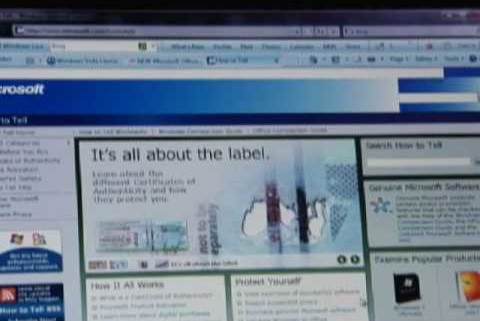Tag Archive for: piracy
Weird Malware Called Oddball Blocks You From Accessing Piracy Sites Instead Of Hacking Device; What Kind of Sorcery is This?
/in Computer Security
A weird malware is currently confusing some security experts and researchers. The reason behind this is that this new computer virus seems to have no interest in hacking your device.

(Photo : Photo by Justin Sullivan/Getty Images)
Instead, the new Oddball malware blocks explicitly you from accessing piracy websites. Based on its process, some researchers claimed that this could even be a good malware since it can stop people from downloading or viewing paid content for free.
As of the moment, piracy is still an issue since it can prevent the original creators of new songs, movies, apps, and other things from raising incomes. But, there’s a chance that this new malware could somehow help solve this problem.
Specifically, involved security researchers confirmed that the new Oddball computer virus blocks infected computers from visiting these illegal websites. However, they did not confirm if the malware can also prevent clean devices.
Weird Malware Oddball’s Details
As of the moment, many hacking groups are developing malware and ransomware that could allow them to breach companies’ systems. These include the new ransomware targeting iConstituent, as well as the REvil’s malware.

(Photo : Photo by Tomohiro Ohsumi/Getty Images)
Related Article: BUSTED: Ukraine Ransomware Gang Known for Hacking Universities Arrested
But, the new Oddball is not like these computer viruses. According to Threat Post’s latest report, the new malware modifies the HOSTS file on the infected system.
Security experts explained that this method is quite efficient since it can stop the device from access a certain web address, which is the main goal of Oddball.
However, many techie users can easily prevent the malware’s effect since it has no persistence mechanism.
“This seems to be a fresh trick on an old attack of compromising people attempting to download pirated software and media,” explained Netenrich’s Threat Intelligence Advisor John Bambenek.
“In this case though, it seems to be an individual or group trying to protect intellectual property, but make no mistake, this is still clearly criminal behavior,” added the security…
Malaysia Looks To Prosecute Homeowners Where Accused Streaming Piracy Occurs
/in Internet SecurityBack in the early days of filesharing clients and bittorrent being the focus of industry anti-piracy efforts, it was rare but not unheard of for end users to be targeted with lawsuits and criminal prosecution for copyright infringement. With the piracy ecosystem largely moving off of those kinds of filesharing platforms and more into a realm in which end users instead simply stream infringing material over the wire, rather than downloading it directly to their own machines, the focus on the consumer of pirated material has fallen by the wayside. Instead, the focus is now on the infringing sites that offer those streaming materials to the public. This makes a great deal of sense, actually, as the average user plausibly can claim ignorance as to the illicit nature of streamed material, combined with the simple fact that, unlike bittorrent technology, streaming material doesn’t simultaneously offer it up to others as well.
Again, this makes sense.
Well, someone should reach out to the Malaysian government, because its new plans to fight piracy occurring with the aid of in-house Android boxes includes a strategy to prosecute any homeowner where such a device used for infringement exists.
There are many strategies available but the government in Malaysia is currently considering something unheard of anywhere on the planet. While it hasn’t shied away from ordering ISPs to block pirate sites, it now wants to hit consumers of content too, specifically those using Android-style set-top boxes.
The mission of the National Film Development Corporation Malaysia (FINAS) is sometimes compared to that of the MPAA in the US. Unlike the MPAA, however, FINAS is a government department within the Ministry of Communications and Multimedia. Its chairman, Datuk Hans Isaac, says that it’s time to hold the public accountable for piracy.
“I’m putting a paper together to propose that the owner of the house is responsible for the use of illegal Android TV boxes,” he said at the Fast Track 2019 Creative Digital Economy Forum in Cyberjaya.
This plan should raise the eyebrows for several reasons. The whole thing looks a bit like the strategy used by copyright trolls, where IP addresses are used to identify infringers, except that IP addresses make for shitty evidence as to who is actually infringing. After all, the account holder of an internet service isn’t the only individual who might use that service. The same goes with homeownership, except more so (more on that in a moment). If IP addresses are bad at determining who actually infringed on a copyright, home-ownership records must represent a step further back from actual evidence.
And the government isn’t even trying to pretend that its plans will make good on catching the party actually infringing copyright.
In the United States, Europe and elsewhere it’s not uncommon for copyright trolls to blame Internet subscribers (often the homeowner) for Internet piracy. However, it seems that FINAS wants to take things a whole lot further by placing the responsibility for piracy on those who may be innocent and/or completely absent.
“It doesn’t matter if the person is renting the house to another person who bought the device,” the FINAS chairman clarified.
This can be paraphrased as: “We’re not actually all that concerned if we catch the infringing party. We mostly just want someone to blame for all of this, so we’ll settle for whoever owns the abode, whether they live there or not.” The potential that this new plan will ensnare innocent parties is nearly 100%. It’s also going to be absolute hell for the real estate rental market. That sound you hear is a thousand Malaysian real estate lawyers scrambling to revise lease agreements for their customers.
Open for discussion is exactly how effective all of this will be anyway.
Norman believes that when tackling the problem, the Malaysian Communications and Multimedia Commission (MCMC) should consider restricting Internet access to those who utilize pirate services.
Again, it remains unclear how the government could determine who these people are. The main problem cited isn’t easily-trackable BitTorrent users but those who frequent streaming sites, portals, and other services.
Which is why the strategy has always been to go after and/or block the sites themselves, rather than the end user streaming the content. What silver bullet the Malaysian government has crafted to be able to track this sort of thing remains unknown at this point.
But what isn’t unknown is just how antithetical to justice this plan is.
Permalink | Comments | Email This Story
Techdirt.
UFC Broadcast Partner Goes Pay-Per-View And Pushes Fans To Piracy
/in Internet SecurityIt will not come as news to the regular Techdirt reader that the folks behind Ultimate Fighting Championship truly hate pirate streams of its fight-nights. For years now, UFC has done everything from punishing some of its own biggest fans to petitioning the government and courts to strictly block any unauthorized broadcasts. In other words, UFC’s stance is that it will take any action necessary to prevent people from pirating its product.
In which case, UFC may want to have a word with at least one of its broadcast partners. BT Sport, the UFC’s broadcast partner in the UK, recently made the decision to suddenly hit its subscribers with an additional pay-per-view fee to watch the bigger UFC matches. The move was met with catastrophic results.
BT Sport, the broadcasting rights owner for UFC (Ultimate Fighting Championship) events in the UK has decided that it would be a good idea to charge its subscribers an additional fee to watch big matches. BT Sport has been offering UFC content in the UK since 2013, with the regular subscribers experiencing no weird or optional limitations. However, the company decided to take a turn this Saturday with the UFC 239 match between Jon Jones and Thiago Santos. To watch the fight, subscribers were asked for an additional “pay per view” fee of £19.95.
Instead of seeing more money flowing in, BT Sport was met with rejection as its regular subscribers decided to turn to piracy and watch the match through illicit channels. In addition to this momentary failure, BT Sport experienced subscription cancellations, as many were paying for a package only to access UFC events. Obviously, this didn’t play out the way that the broadcasting platform thought it would, and it serves as an example for all live sport streaming platforms which could be processing and evaluating such moves right now.
That this happened is useful for pointing out a number of things. For starters, it again highlights that piracy is a function of price and convenient availability. It’s one thing to lock a UFC match behind a broadcast subscription, but to then slap a PPV fee on those already subscribing is obviously going to piss people off. And, more to the point, change the equation as to the price and availability of the UFC match. It should come as no surprise, then, that this pushes the public to illicit channels to watch these fights.
That said, the levels at which this occurred and were able to be reported on were significant.
According to TorrentFreak, who highlighted the incident, several pirate IPTV service providers told them that there was a noticeable spike in the demand for BT Sport content during the weekend, and this was only the beginning.
Which brings us to the next lesson that should be learned here: if a broadcaster rather cravenly looks to extract money from current customers for something it hadn’t previously charged for, and for which it is providing no additional new value, the slap back from customers is going to be swift and severe.
The subscribers of BT Sport packages did what they did not only out of choice but also as part of an agreed boycott that was organized on social media platforms like Reddit. By boycotting UFC 239, the subscribers hope that they will force the broadcaster to reconsider, and take PPV charging out of their strategy in the future. This is not the case for everyone though, as some express their satisfaction with the quality of the content and the experience of consuming it on pirating platforms.
Which brings us to a third lesson that should be learned: once you push people to piracy, you might not be able to get them back. Pirating UFC fights, and many other things as well, is something of a pain in the ass. All things else being equal, people generally want to go through the proper channels for their entertainment. But all else is not equal and when people discover the low-level pain that is pirating, it may cause them to explore that avenue for all kinds of other entertainment.
All of this because BT Sport wanted to turn a previously-included sport into PPV? I would hope UFC would be discussing this with its broadcast partners, as concerned as it is about people not pirating its fights.
Permalink | Comments | Email This Story
Techdirt.

